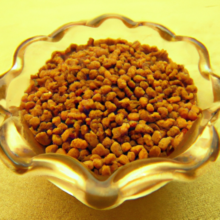10 Reasons Why Ginger Should Be A Part Of Your Diet
Imagine enhancing your diet with a simple yet incredibly powerful ingredient: ginger. This humble root has been used for centuries in various cultures for its impressive health benefits. From its ability to soothe digestive issues to its potent anti-inflammatory properties, ginger can do wonders for your well-being. And that’s just the beginning. In this article, we will explore ten compelling reasons why ginger should become an essential component of your everyday meals. Read on to discover how this incredible spice can spice up your health in more ways than one!
Ginger is Nutrient-Rich
Ginger is not only a flavorful and aromatic spice, but it is also packed with essential nutrients that can benefit your overall health. One of the key nutrients found in ginger is Vitamin C, which plays a vital role in supporting immune function and promoting collagen production for healthy skin. Additionally, ginger contains Vitamin B6, an essential vitamin that aids in brain development and function. This vitamin also helps in the production of neurotransmitters, which are crucial for proper nerve function.
In addition to vitamins, ginger also provides a good source of minerals such as iron. Iron is essential for the production of hemoglobin, the molecule responsible for carrying oxygen throughout the body. Including ginger in your diet can help prevent iron deficiency anemia and promote healthy red blood cells. Ginger is also a great source of potassium, a mineral that supports proper heart and muscle function. Furthermore, ginger contains magnesium, which plays a vital role in muscle and nerve function, as well as maintaining healthy blood pressure levels.
Ginger Has Anti-Inflammatory Properties
Ginger has long been used as a natural remedy for reducing inflammation in the body. It contains powerful compounds called gingerols and shogaols, which have been found to have anti-inflammatory effects. By including ginger in your diet, you can experience a reduction in joint pain caused by conditions such as arthritis. These anti-inflammatory properties may also help to alleviate muscle soreness and aid in the recovery process after intense physical activity.
Furthermore, ginger has shown promise in managing inflammatory conditions such as osteoarthritis and rheumatoid arthritis. The compounds found in ginger are believed to inhibit the production of certain pro-inflammatory substances in the body, which can help reduce inflammation and alleviate symptoms associated with these conditions. By incorporating ginger into your daily routine, you may find relief from the discomfort and limitations caused by inflammation.
Ginger Improves Digestion
If you often experience digestive issues such as nausea or indigestion, ginger may be the natural solution you’ve been searching for. Ginger has been used for centuries to ease nausea, whether it’s caused by motion sickness, morning sickness during pregnancy, or simply an upset stomach. The active compounds found in ginger help to soothe the digestive system, reducing feelings of nausea and promoting overall comfort.
In addition to alleviating nausea, ginger can also provide relief from indigestion. It aids in the digestion process by increasing the production of digestive enzymes and improving overall digestion efficiency. Ginger helps to break down food more effectively, reducing symptoms such as bloating, gas, and abdominal discomfort. By incorporating ginger into your diet, you can experience improved digestion and a reduction in uncomfortable digestive symptoms.
Furthermore, ginger has been found to enhance nutrient absorption. The compounds in ginger stimulate the production of digestive enzymes, which help to break down and absorb essential nutrients from the food you consume. This means that by consuming ginger, you can maximize the benefits of the foods you eat and ensure you are obtaining the necessary vitamins and minerals for optimal health.
Ginger Boosts Immune System
If you’re looking for a natural way to boost your immune system, look no further than ginger. The potent combination of antioxidants, vitamins, and minerals found in ginger can enhance the body’s immune response. Ginger contains antioxidants that help to combat free radicals in the body, which can weaken the immune system and contribute to the development of various diseases.
Including ginger in your diet can also help in reducing the risk of infections. Ginger has been traditionally used as a natural remedy for colds and flu, as it contains compounds that have antimicrobial properties. These compounds can help inhibit the growth of certain bacteria and viruses, reducing your chances of falling ill.
By incorporating ginger into your diet, you can strengthen your immune system, making it more resilient and better equipped to fend off infections and diseases.
Ginger Aids Weight Loss
If you’re on a weight loss journey, ginger can be a valuable addition to your diet. Ginger has been found to increase metabolism, which is the rate at which your body burns calories. By boosting your metabolism, ginger can aid in weight loss by helping you burn more calories throughout the day, even while at rest.
Additionally, ginger has appetite-suppressing properties, making it easier to control your cravings and reduce your calorie intake. This can be especially beneficial for those struggling with emotional eating or frequent snacking. By including ginger in your diet, you may find it easier to adhere to a calorie-restricted diet and achieve your weight loss goals.
However, it’s important to note that ginger is not a magic solution for weight loss. It should be consumed as part of a balanced diet and paired with regular exercise for optimal results. Incorporating ginger into your healthy lifestyle can provide an extra boost to your weight loss efforts.
Ginger Helps Manage Diabetes
For individuals living with diabetes, ginger can be a valuable addition to their diet. Ginger has been found to help lower blood sugar levels by increasing insulin sensitivity. Insulin is a hormone produced by the pancreas that regulates blood sugar levels. By improving insulin sensitivity, the body becomes more efficient at utilizing glucose, resulting in lower blood sugar levels.
Including ginger in your diet can also contribute to improved glycemic control. Ginger has been found to slow down the absorption of carbohydrates, preventing sudden spikes in blood sugar levels. This can be particularly beneficial for individuals with type 2 diabetes who need to carefully manage their blood sugar levels.
However, it’s important to consult with a healthcare professional before making any dietary changes, especially if you have diabetes. They can provide personalized guidance and ensure that ginger is a suitable addition to your diabetes management plan.
Ginger Supports Cardiovascular Health
Maintaining cardiovascular health is crucial for overall well-being, and ginger can play a role in supporting a healthy heart and circulatory system. Ginger has been found to help regulate blood pressure levels, reducing the risk of hypertension and related cardiovascular complications. By including ginger in your diet, you can promote healthy blood flow and maintain optimal blood pressure levels.
Ginger may also aid in reducing cholesterol levels. High levels of LDL (bad) cholesterol can contribute to the development of cardiovascular diseases, such as heart disease and stroke. The compounds found in ginger have been found to help lower LDL cholesterol levels, reducing the risk of these chronic conditions.
Additionally, ginger has been found to have antiplatelet effects, meaning it can help prevent the formation of blood clots. Blood clots can block blood vessels, leading to serious cardiovascular events. By including ginger in your diet, you can reduce the risk of blood clot formation and promote overall cardiovascular health.
Ginger Enhances Brain Function
If you’re looking to give your brain a boost, ginger can be a valuable addition to your daily routine. Ginger has been found to improve cognitive performance and protect against age-related decline in brain function. The antioxidants found in ginger help to combat oxidative stress in the brain, which can lead to cognitive impairment and neurodegenerative diseases.
Including ginger in your diet can help enhance memory, attention, and overall cognitive function. The neuroprotective properties of ginger can help maintain the health and vitality of brain cells, promoting optimal brain function as you age.
Ginger Promotes Healthy Skin
Ginger can do wonders for your skin, thanks to its anti-inflammatory and antioxidant properties. By reducing inflammation in the body, ginger can help alleviate skin conditions such as acne and rosacea. It can also help reduce redness and irritation, leaving your skin looking clearer and healthier.
Furthermore, the antioxidants found in ginger can help protect the skin from damage caused by free radicals, which can contribute to premature aging. Ginger can help prevent the breakdown of collagen, a protein responsible for maintaining the skin’s elasticity and firmness. By including ginger in your diet, you can promote a more youthful and radiant complexion.
Ginger May Reduce Cancer Risk
While further research is needed, ginger has shown promise in reducing the risk of certain types of cancer. The antioxidants found in ginger help to neutralize harmful free radicals in the body, which can damage cells and contribute to the development of cancer.
Additionally, ginger has been found to inhibit the growth of cancer cells in laboratory studies. The compounds in ginger have shown potential in suppressing the growth and spread of various types of cancer cells, including those associated with colorectal, ovarian, pancreatic, and prostate cancer.
While ginger alone cannot prevent or cure cancer, it can be a valuable addition to an overall healthy lifestyle and a diet rich in fruits, vegetables, and whole grains. Consult with a healthcare professional for personalized guidance on cancer prevention and treatment.
In conclusion, ginger is a versatile and nutrient-rich spice that offers a myriad of health benefits. From its anti-inflammatory properties to its potential cancer-fighting abilities, ginger can positively impact various aspects of your health. Whether you choose to incorporate ginger into your meals, consume it as tea, or take it in supplement form, adding ginger to your diet can be a valuable step towards improving your overall well-being. So why wait? Start enjoying the many benefits of ginger today and reap the rewards of a healthier, happier you.




